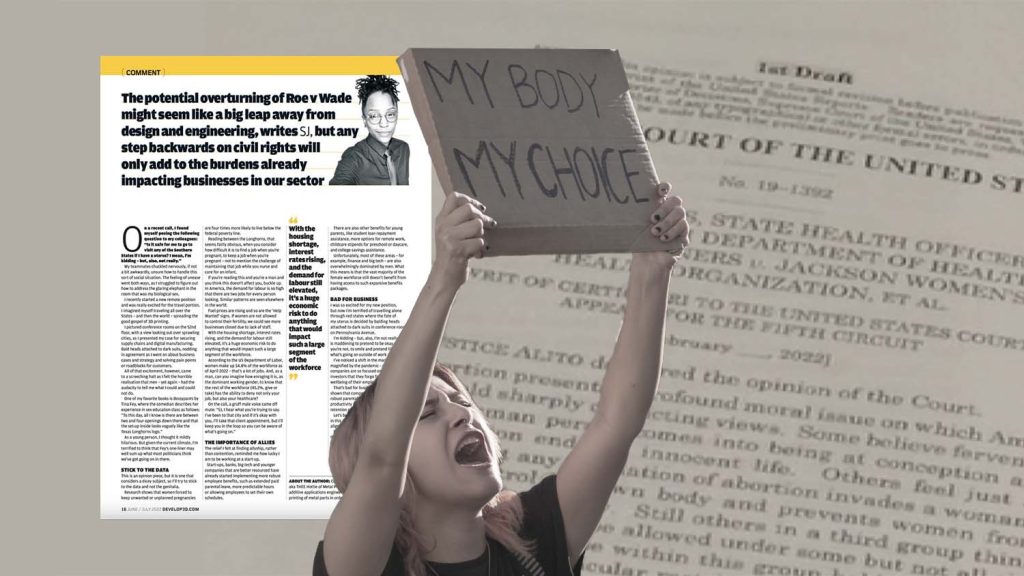The overturning of Roe v Wade might seem like a big leap away from design and engineering, writes SJ, but any step backwards on civil rights will only add to the burdens already impacting businesses in our sector
On a recent call, I found myself posing the following question to my colleagues: “Is it safe for me to go to visit any of the Southern States if I have a uterus? I mean, I’m kidding – but, also, not really.”
My teammates chuckled nervously, if not a bit awkwardly, unsure how to handle this sort of social situation. The feeling of unease went both ways, as I struggled to figure out how to address the glaring elephant in the room that was my biological sex.
I recently started a new remote position and was really excited for the travel portion. I imagined myself traveling all over the States – and then the world – spreading the good gospel of 3D printing.
I pictured conference rooms on the 52nd floor, with a view looking out over sprawling cities, as I presented my case for securing supply chains and digital manufacturing.
Bald heads attached to dark suits, nodding in agreement as I went on about business cases and strategy and solving pain points or roadblocks for customers.
All of that excitement, however, came to a screeching halt as I felt the horrible realisation that men – yet again – had the audacity to tell me what I could and could not do.
One of my favorite books is Bossypants by Tina Fey, where the comedian describes her experience in sex education class as follows: “To this day, all I know is there are between two and four openings down there and that the set-up inside looks vaguely like the Texas Longhorns logo.”
As a young person, I thought it mildly hilarious. But given the current climate, I’m terrified to think that Fey’s one-liner may well sum up what most politicians think we’ve got going on in there.
Stick to the data
This is an opinion piece, but it is one that considers a dicey subject, so I’ll try to stick to the data and not the genitalia.
Research shows that women forced to keep unwanted or unplanned pregnancies are four times more likely to live below the federal poverty line.
Reading between the Longhorns, that seems fairly obvious, when you consider how difficult it is to find a job when you’re pregnant, to keep a job when you’re pregnant – not to mention the challenge of maintaining that job while you nurse and care for an infant.
If you’re reading this and you’re a man and you think this doesn’t affect you, buckle up. In America, the demand for labour is so high that there are two jobs for every person looking. Similar patterns are seen elsewhere in the world.
Fuel prices are rising and so are the ‘Help Wanted’ signs. If women are not allowed to control their fertility, we could see more businesses closed due to lack of staff.
With the housing shortage, interest rates rising, and the demand for labour still elevated, it’s a huge economic risk to do anything that would impact such a large segment of the workforce.
According to the US Department of Labor, women make up 54.8% of the workforce as of April 2022 – that’s a lot of jobs. And, as a man, can you imagine how enraging it is, as the dominant working gender, to know that the rest of the workforce (45.2%, give or take) has the ability to deny not only your job, but also your healthcare?
On the call, a gruff male voice came off mute: “SJ, I hear what you’re trying to say. I’ve been to that city and if it’s okay with you, I’ll take that client appointment, but I’ll keep you in the loop so you can be aware of what’s going on.”
Civil Rights: The importance of allies
The relief I felt at finding allyship, rather than contention, reminded me how lucky I am to be working at a start-up.
Start-ups, banks, big tech and younger companies that are better resourced have already started implementing more robust employee benefits, such as extended paid parental leave, more predictable hours or allowing employees to set their own schedules.
There are also other benefits for young parents, like student loan repayment assistance, more options for remote work, childcare stipends for preschool or daycare, and college savings assistance.
Unfortunately, most of these areas – for example, finance and big tech – are also overwhelmingly dominated by men. What this means is that the vast majority of the female workforce still doesn’t benefit from having access to such expansive benefits packages.
Bad for business
I was so excited for my new position, but now I’m terrified of travelling alone through red states where the fate of my uterus is decided by balding heads attached to dark suits in conference rooms on Pennsylvania Avenue.
I’m kidding – but, also, I’m not really. It is maddening to pretend to be okay when you’re not, to smile and pretend like none of what’s going on outside of work affects you.
I’ve noticed a shift in the market – magnified by the pandemic – where companies are so focused on dividends for investors that they forgo focusing on the wellbeing of their employees.
That’s bad for business. Research has shown that companies that incorporate robust parental policies have improved productivity and increased employee retention rates.
Let’s be clear: I don’t want to put a pin in this and circle back next week. Let’s get aligned now.
Robbing women of their civil rights to control their own fertility comes at an enormous cost to businesses – and what with inflation, rising interest rates and a supply chain further complicated by war in Ukraine, is your business really ready to be thrown by the horns?






